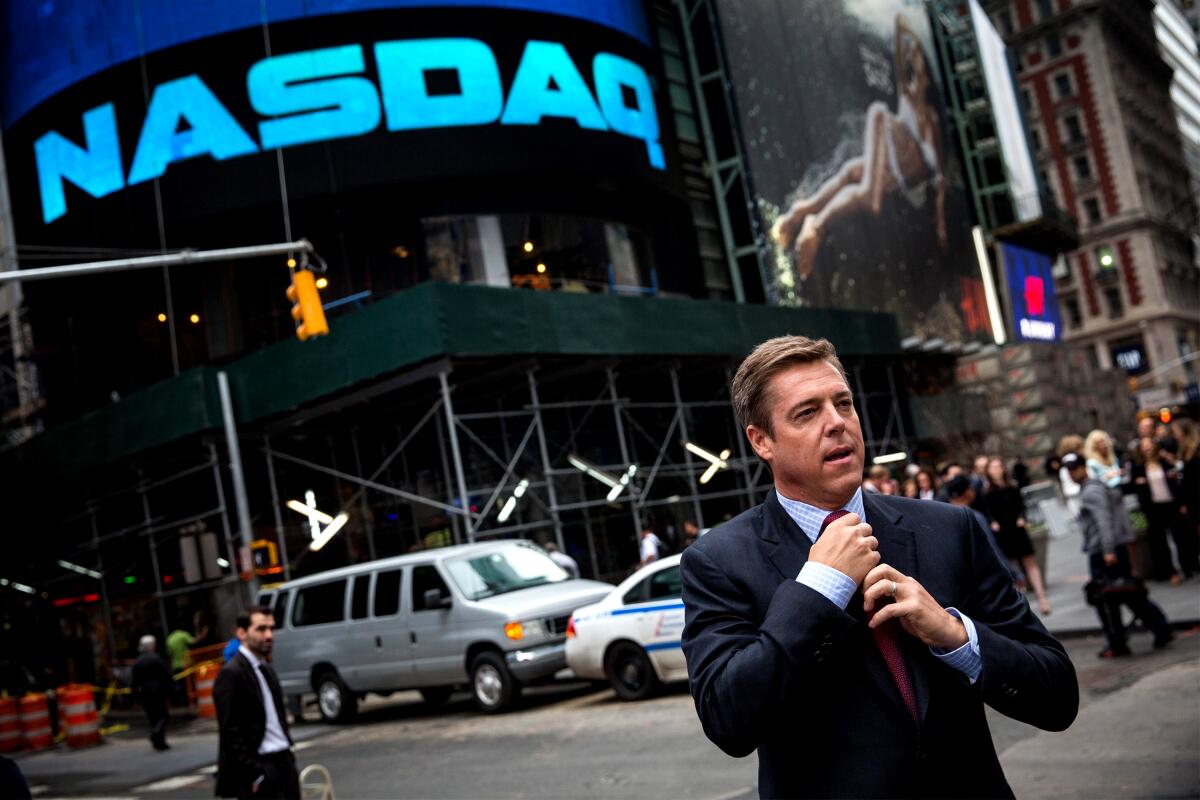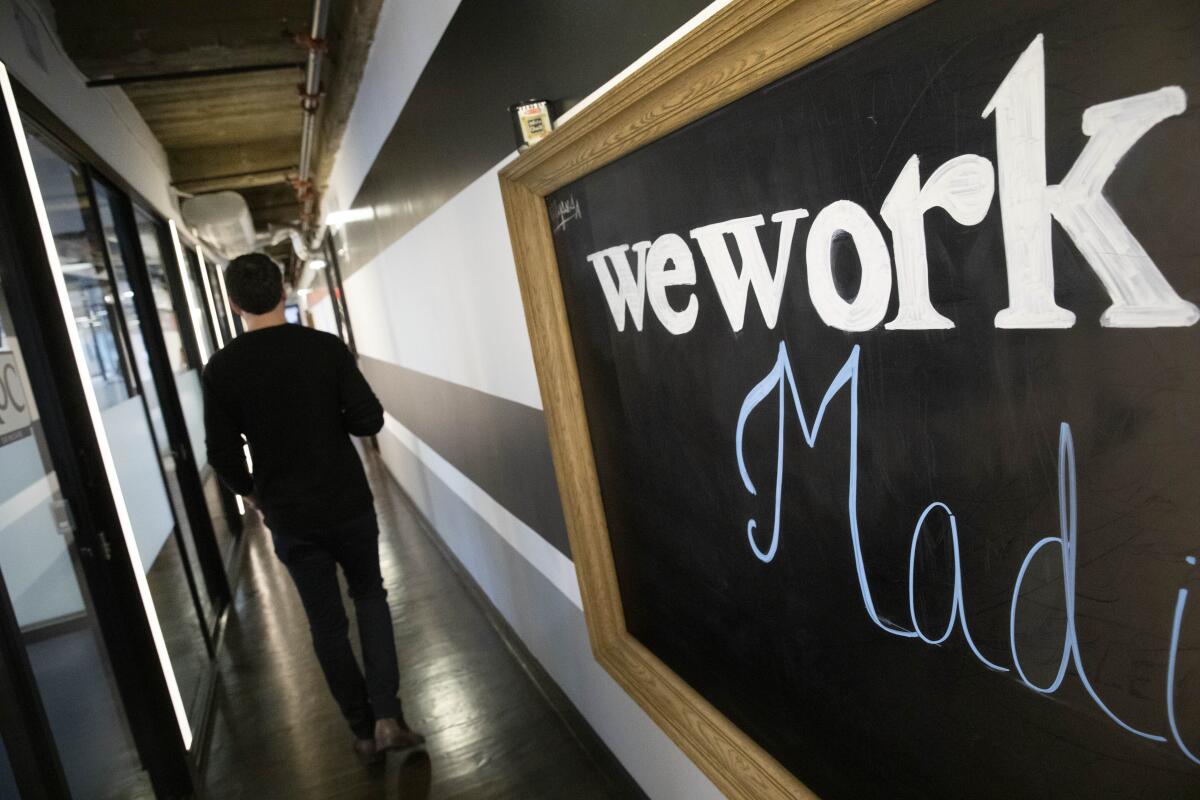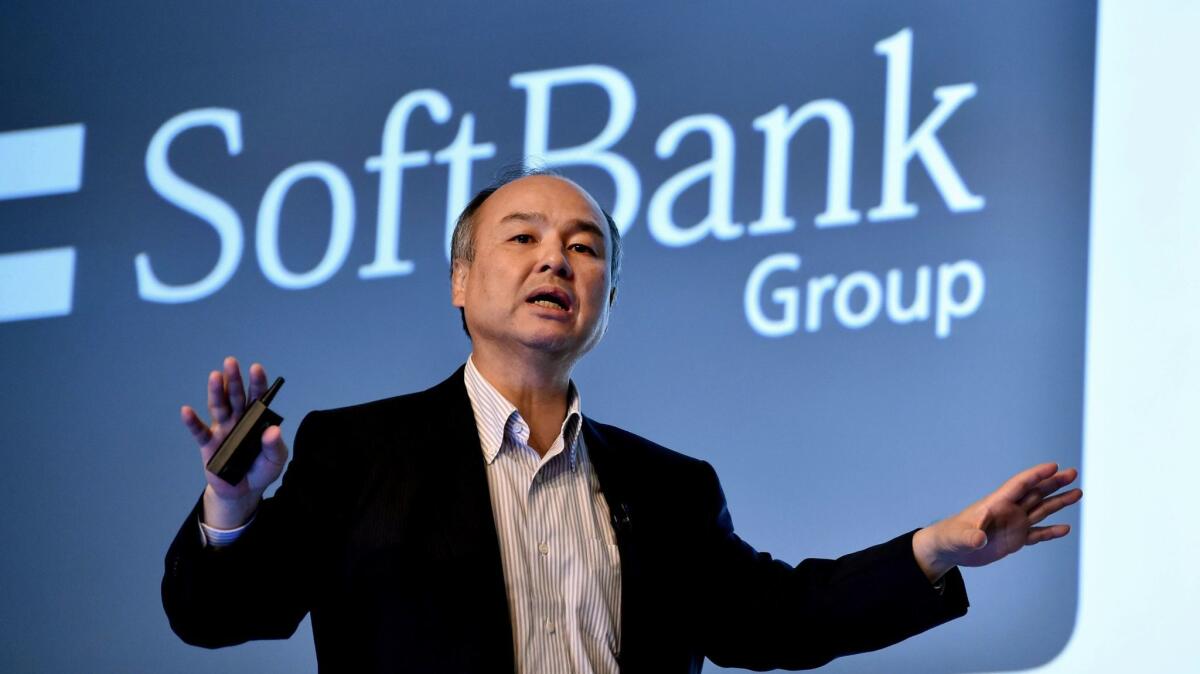Driven: Behind the rise, stumble and rebirth of Fair and its car-buying app

- Share via
Many have tried to upend the painstaking process of getting a car.
From Cars.com and Edmunds to Autotrader and Kelley Blue Book, online buying and leasing has grown into a crowded terrain that leaves consumers more confused and less certain than ever of what a “good” deal actually looks like. But no matter how newfangled some offerings may seem — Carvana’s automated car-vending machines are a particularly mystifying example — most consumers still end up at the dealership, haggling and buried under mountains of paperwork.
A very different approach surfaced three years ago. It’s an app called Fair, which is hell-bent on giving vehicle shoppers a novel experience: affordable, flexible, used-car subscriptions right from their smartphones.
This is the story of Fair’s rise, stumble and early-days rebirth.
Fair’s mission was — and is — bold: give consumers the chance to subscribe to a used vehicle instead of facing the complexities and constraints of traditional leases or ownership. And conduct the entire transaction, from selecting a car to setting up monthly payments, within a smartphone app.
When users enter the Fair program, they select a vehicle for a preset monthly fee — the current sweet spot, the company says, is $300 to $400 a month. That includes tax, registration, limited warranty, routine maintenance, roadside assistance and even extra mileage (if desired). A one-time start-up fee is added — the median is $1,080 — and the customer’s total drive-off cost is itemized in the app. Customers with issues such as borderline credit or a bad driving record may be required to pay an additional refundable security deposit, also calculated in-app.
That’s on par with the cost of an auto loan on the same used car — except that with Fair’s price, all the other services and fees are bundled in.
Before checking out, the user enters his or her driver’s license information, which helps Fair confirm that he or she has a valid license as well as pre-approve the customer to shop and see what the real, not estimated, costs will be, without affecting the person’s FICO score. Finally, the subscriber submits his or her own insurance information (one detail Fair doesn’t handle), a digital form of payment — usually a credit or debit card — and selects the date and time he or she would like to pick up the wheels.
In the background, Fair buys the car from a local dealer, holds the title, and handles the registration on behalf of the customer. The customer simply shows up at the dealership, shows his or her ID and drives away. Fair gives customers three days or 100 miles to return the vehicle for a full refund if they aren’t happy.
One of Fair’s biggest differentiators is its flexible terms. Customers can keep their vehicle a few months or a few years, with no penalty for returning it when they want or need to, other than their initial, upfront payment, which acts as a natural disincentive to people hoping to treat a subscription like a rental.
Between healthy early marketing campaigns and a boost from viral, word-of-mouth success stories, 3.5 million users have downloaded the app since Fair’s inception. Investors liked the Santa Monica company’s model: Up to now, no one had figured out how to offer leases on used vehicles at scale let alone with flexible terms. Fair doesn’t comment on financials, but a source familiar with the operation puts the total raised to date at $500 million in equity and more than $1 billion in debt.
The amount of funds needed to build out the operation — the software, the team, the dealer network, the necessary inventory of used cars and so on — was considerable. There were other growth initiatives in the works too; in 2018 and early 2019, such hyper-growth strategies were the rebel yell of any ambitious, disruptive tech start-up.
But by the fall of 2019, investors were growing increasingly bearish about companies big on valuations and small on long-term strategy and profitability. The timing was fateful. Fair was looking to raise an additional $500 million, but by October, seeing the swift shift of mood on Wall Street, the company instead went to its lead investor, SoftBank Group Corp. — already in hot water for overfunding some of its highflying tech investments — and asked for a bridge loan. SoftBank came through with some funding and strategic support while the company retooled its business model, cost structure and growth plan.
Overnight, Fair stopped transactions in its app and a new management team stepped in. At the end of January, after three months of toil, Fair relaunched the app.
Fair’s novel approach is the latest invention of its founder, Scott Painter, an L.A. serial entrepreneur who has been on a mission since the 1990s to reimagine the old-school car dealership experience. In 1998 he founded CarsDirect to offer consumers an upfront price — unheard of at the time. The business still operates today under the umbrella of Internet Brands, an El Segundo company that is in turn owned by global investment firm Kohlberg Kravis Roberts & Co.
Next came TrueCar in 2005 (originally Zag), which showed consumers what others paid for the same car. (Full disclosure: I was an independent board director for Zag/TrueCar from 2005 to 2010.) TrueCar went public in 2014.
Painter treats every new vision with the do-or-die adrenaline of a fighter-jet pilot at takeoff. With both CarsDirect and TrueCar, his relentless desire to give the consumer price transparency raised the ire of dealers, who argued his business model infringed on franchise law as well as their ability to make margin. He stepped down as chairman of CarsDirect in 2000, when racing and retail legend Roger Penske invested in the company and took that seat.
In 2015, he left TrueCar after facing constant retailer pushback, board pressure to be more operational and growth pains.
“Gaining Roger at the helm was an A-play for CarsDirect,” Painter said. “And taking TrueCar public was equally important. I’ve never been interested in hitting a single or a double — I’m only interested in disrupting how things get done.”
It didn’t take long for Painter’s next Big Idea to solidify. In 2016, he co-founded Fair with Georg Bauer, a financial services veteran with experience at Mercedes-Benz, Daimler, BMW and Tesla.
One of the many investment pitches they made was to SoftBank. The Japanese-owned conglomerate was well known for investing in such fast-growth tech companies as Uber, Alibaba, Slack and WeWork. In late 2018, it sank $300 million into Fair’s $385-million Series B, its fourth round of funding.
For a start-up barely 2 years old, it was a massive nod of confidence and the infusion needed to continue to grow (eventually Fair was in 18 states and 30 markets). It also fueled the launch of Fair Go in January 2019, a program that provided Uber drivers with weekly access to vehicles at a, yes, fair price. (Uber had sold its leasing business, Xchange Leasing, to Fair for $167 million in 2018.) Fair Go was meant to generate new Fair subscribers and more drivers for Uber. SoftBank hoped the latter would help bolster Uber’s initial public offering later that spring.
But in May 2019, Uber went public at about half the valuation bankers had assigned it a few months before. Another SoftBank marquee investment, the co-working office space pioneer WeWork, never even made it to market as investors got spooked by giant losses and the antics of its CEO, Adam Neumann, who resigned in September, shortly before the company’s IPO was yanked.
Other tech highfliers such as Lyft, Airbnb and Peloton also stumbled. The giddy period of supersonic growth, maverick CEOs and unquestioned backing of companies lacking profits or long-term fundamentals was coming to an end.

In September, about the time WeWork’s dirty laundry was getting global attention, Fair needed another round of financing. But investors were suddenly not interested. Painter, looking to raise $500 million, said that Fair went nearly overnight from being seen as a SoftBank highflier to a capital-intensive business that needed to cut costs and restructure.
Fair’s massive float of used cars and its expansion plans couldn’t wait for the next big round to close. Painter approached SoftBank for a bridge loan, but the investor — facing massive losses on its problematic tech portfolio — pushed back, challenging the core business strategy and operations. Instead of the hundreds of millions Painter had originally wanted, SoftBank agreed to give Fair tens of millions.
Painter laid off 40% of Fair’s workforce and stepped down as CEO, moving into the chairman’s seat. Today, he takes a glass-half-full perspective on what insiders close to the events say was a high-stakes investor-versus-entrepreneur face-off.
“Frankly, SoftBank didn’t bail us out, nor did they take full control,” Painter said. “They could have done either, but instead they showed their faith in Fair’s ability to grow sustainably by remaining invested — there’s a new world order, and they are figuring out which bets they’ve made that can be sustainable, profitable businesses.”
SoftBank installed a member of its leadership, Adam Hieber, as interim CEO. He got to work fast, restructuring the team, streamlining the business and slowing growth plans. Fair turned off the ability to transact in the app. Existing subscribers were unaffected — the company says it has put 28,000 consumer and 50,000 Uber subscriptions on the road since inception — but all new subscriptions were paused. According to Fair, thousands of people still went into the app every day, where they were met with a “we’ll be relaunching in early 2020” message.

“Operationally, we had to focus on simplicity above almost everything else,” Hieber said in his first interview since taking the helm last fall. “A lot goes on behind the scenes — finding the right pre-owned cars, sourcing the right debt to make those purchases, and getting keys to our customers as quickly as possible. But for the customer, it should be almost as easy as ordering a cup of coffee.”
Other measures included setting new pricing constraints around what Fair pays for each vehicle in order to pass on competitive pricing to its subscribers. Fair also pruned the list of dealerships it works with to greatly cut down on instances of slow responses or cancellations. And Fair halted its weekly rental program for Uber drivers.
Another imperative was to ensure that every new subscription Fair approves adds positive margin to the business. One Fair dealer I spoke with likes the new business Fair brings to his dealership, even though some pricing flexibility is taken out of dealers’ hands. Ultimately, it serves him and other dealers as a used-car inventory management tool.
The relaunch started in California, and on Monday, the app went live in Florida; Texas will follow in coming weeks.
Fair says there was plenty of pent-up demand when it turned the app back on Jan. 31. Since relaunch, 50,000 new customers have downloaded the app and submitted their information. The company sent out emails to those people on Super Bowl Sunday and on Oscars night. More than 57% opened the Super Bowl email and went into the app; 40% of recipients did the same during the Oscars — high engagement by any yardstick.
Fair says its new customers are, on average, 31 years old with clean credit. “It’s amazing — when people realize what we are offering, they come,” said Ed Brojerdi, Fair’s global head of brand. “They’re used to getting everything delivered by Amazon, so Fair makes sense to them.”
There’s plenty of competition for subscription car services. That includes Access by BMW ($998 to $2,699 a month), Mercedes-Benz Collection ($1,095 to $3,595 a month) and Hertz My Car ($999 to $1,399 a month). All of these programs carry start-up fees and multiple terms and restrictions, and the pricing remains out of reach of what the average consumer is able or willing to pay.
Interim CEO Hieber, who is based in London, intends to hand off the business to a new chief executive in the not-too-distant future. Whoever’s in the driver’s seat faces complex questions:
Will SoftBank remain supportive? Given the company’s ongoing investment and management involvement, its stake in Fair seems to be, at least for now, well grounded.
Can Fair attract enough subscribers, dealer partners and investment funds fast enough, let alone choreograph it all in a sustainable, fiscally responsible way? That is clearly the financial markets’ new and likely enduring battle cry.
More to Read
Inside the business of entertainment
The Wide Shot brings you news, analysis and insights on everything from streaming wars to production — and what it all means for the future.
You may occasionally receive promotional content from the Los Angeles Times.










